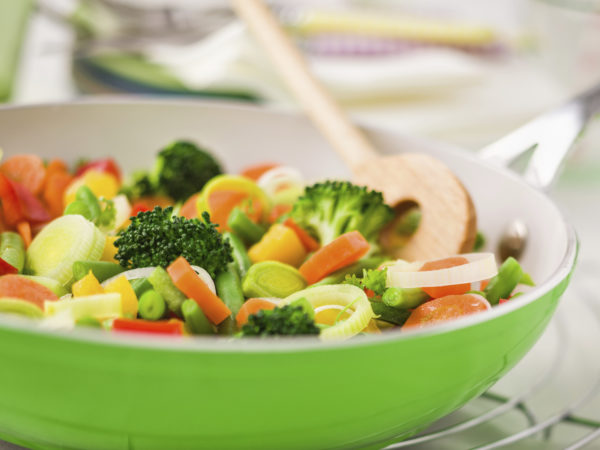Rethinking Raw Foods?
I’ve been vegan for several years and just have ended two months as a raw food vegan. I felt I was not getting enough complete protein and calcium so I began incorporating grains back into my diet, but at times, this change seems like too much for my digestion. Do you have any suggestions for transitioning from one diet to another?
Andrew Weil, M.D. | November 5, 2012

I’m not a proponent of a raw food diet. The main argument in favor of eating this way is that cooking destroys vital enzymes in foods. In fact, these enzymes play no role in human nutrition, because stomach acid destroys them as efficiently as cooking. In addition, some vitamins and minerals found in vegetables are actually less bioavailable when you eat these foods raw. For example, you cannot get much lycopene, the carotenoid pigment that is protective against prostate cancer, from raw tomatoes. The carotenoids in carrots are more bioavailable from cooked carrots than they are from raw ones.
Another disadvantage of eating raw foods is that many of the natural toxins in edible roots, seeds, stems and leaves are destroyed by cooking them in water. For example, alfalfa sprouts contain canavanine, a natural toxin that can harm the immune system; button mushrooms contain natural carcinogens, and celery produces psoralens, compounds that sensitize the skin to the harmful effects of ultraviolet radiation in sunlight. Most of these detrimental compounds are broken down by simple cooking.
Finally, to my taste, proper cooking often improves the texture and flavor of foods. I don’t like raw broccoli or overcooked broccoli, but minimal cooking turns it bright green, crunchy-tender, and delicious.
And I’m cautious about vegan diets in general, especially for children. While a vegetarian diet can be very healthy, the vegan diet, comprised only of plant-based foods – no cheese, eggs, honey, or any other animal-derived foods – is more problematic. You can get adequate amounts of protein from plant foods – whole grains, legumes, vegetables, seeds and nuts. (Soy protein is equivalent to the protein you would get from meat, chicken, fish or eggs.) Beyond that, a vegan diet requires you to think about the nutrients you might be missing. These include vitamin B12 (I advise vegans to supplement with 50-100 micrograms of B12 in the form of a good multivitamin, sublingual tablet, nasal spray or gel), vitamin D (I recommend a daily supplement of 2,000 IU of vitamin D3 – cholecalciferol); omega-3 fatty acids (consider taking fish oil or look for new algae-derived supplements that provide both EPA and DHA), and iron (for children; adults should not take iron supplements unless prescribed by a physician), as well as zinc and calcium.
To transition from raw foods diet to a vegan diet, I think it would be best to make the adjustments slowly. Grains may not be the ideal foods to start with. Instead, try cooked vegetables and move slowly from green vegetables to sweet potatoes and squashes. Don’t rush the change.
Andrew Weil, M.D.









